Middle Corridor' To Connect Eurasia: Turkish Minister
WASHINGTON, USA - MAY 22: Turkish Deputy Foreign Minister Yavuz Selim Kiran speaks at a panel at the U.S. House of Representatives as part of the Trans-Caspian Forum on May 22, 2019 in Washington, USA.
WASHINGTON, USA - MAY 22: Turkish Deputy Foreign Minister Yavuz Selim Kiran speaks at a panel at the U.S. House of Representatives as part of the Trans-Caspian Forum on May 22, 2019 in Washington, USA. - Deputy Foreign Minister Yavuz Selim Kiran speaks at Congress at Trans-Caspian Forum
By Umar Farooq
Turkish Deputy Foreign Minister Yavuz Selim Kiran on Wednesday touted the potential of a new transnational infrastructure initiative that would create new transport routes to connect East Asia to Europe.
The "Trans-Caspian East-West Middle Corridor", also known as the "Middle Corridor", would effectively create high-speed rail lines that could ship cargo from the eastern parts of Asia to Europe within two weeks, connecting China through Central Asia, the Caspian Sea and all the way to the Caucasus region.
The corridor, which is yet to be completed, aims to expand markets, create large economic scales and help develop regional cooperation in Eurasia. Turkey's Silk Road Initiative currently stands alongside China's Belt and Road Initiative, another grand infrastructure initiative by Beijing to connect Europe, Asia and Africa.
"This will no doubt be a considerable improvement in terms of time and economy. For such a project to be achieved, there is a need for great infrastructure investment as well as harmonization of policies and legislation in relevant countries," Kiran said at a panel at the U.S. House of Representatives as part of the Trans-Caspian Forum, a conference held in Washington to discuss the corridor and how to enhance business opportunities for it.
This is the fourth year the forum has been held and will bring together diplomats from Afghanistan, Azerbaijan, Georgia, Kazakhstan, Turkey, Turkmenistan and Uzbekistan.
Turkey has created a multitude of transnational infrastructure projects over the past few decades, including an oil pipeline and railway connecting Azerbaijan, Georgia and Turkey and two natural gas pipelines.
Kiran mentioned two other projects within the framework of the corridor. The "Lapis Lazuli Route Agreement" between Afghanistan, Azerbaijan, Georgia, Turkey and Turkmenistan would simplify customs procedures, transit fees and visa arrangements for relevant transport personnel among these five countries.
Turkey also proposed the "Caravanserai Initiative", a roadmap between Azerbaijan, Georgia, Kazakhstan, Kyrgyzstan and Turkey that aims to revive the routes and border crossings from the ancient Silk Road.










